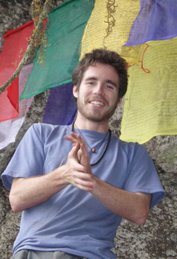
Sections of the prose and poetic inserts are very beautiful and profound in the original Tibetan. Unfortunately I don't have the facility in English to render it in as compelling a way as the author does, but I thought it could be of some interest. Most of what I'm working on is already in English in a translation of a different commentary by Paltrul Rinpoche, the Kunsang Lama'i Shelung, popularly known as the Words of My Perfect Teacher.
from section one of the General Preliminaries, The Difficulty of Finding the Freedoms and Advantages:
There is a technique for protecting your mind from afflictive emotions. As stated in Entering the Conduct:
"With the rope of continuous mindfulness,
If you bind the elephant of mind,
All fears will become nonexistent,
And all virtues will come into your hands."
Your mind is like an elephant or a horse laden with goods, and that mindfulness which observes the virtuous mind of faith and so forth, is like a rope and a post stake. The introspection, which is that which analyzes whether or not you are abiding in the state of that virtuous mind, functions like a shepherd and maintains constant mindful conscientiousness without distraction. Thus, even from holy gurus on down, in order to not be distracted by anything other than their own virtuous mind, having established the body of compassion out of the dharmakaya, they say "I supplicate, look upon me with your wisdom eyes!"
From section two of the General Preliminaries, Mediation on Impermanence:
There are many conditions for death: death through meeting epilepsy, death from being chronically bed-ridden, death by food-poisoning, falling into an abyss, being killed with weapons, and so forth. The time of death cannot be ascertained, like a butter-lamp flickering in the wind, or like baby birds on a tree branch. Thus, after you lay down at night you cannot measure whether or not you will have the causes for waking up the next day. Although you are here this year, there is no certainty about whether or not you will be here next year. Sooner or later, without exception, having abandoned this life you will arrive in the very next world.
From section four of the General Preliminaries, the Faults of Cyclic Existence:
Even in the abodes of the higher realms of gods and men there is not happiness. As said in the Sutra on the Application of Mindfulness,
"Even the very peak of cyclic existence,
Is not a time of happiness."
And also by the Protector Maitreya,
"There is no happiness in the five migrations,
As there is no pleasant smells in an unclean house."
People have the three great root sufferings; the four great rivers of suffering of birth, old-age, sickness and death; the suffering of the apprehension about meeting with enemies; the suffering of apprehension about being separated from loving friends; the suffering of coming down upon the undesirable; and the suffering of not coming right down on top of what is desired.
As it says in the Treasury of Oral Instructions (by Longchen Rabjam),
"Attachment to land and mansions is the iron house of hell,
Children and spouses are a thicket of leaves of swords,
Ornaments and fancy clothing are like blazing tongues of flame,
Food and drink are hammers of burning iron,
Slaves and such are wagers of hell,
Violent anger and fights are like hailstorms of glowing embers,
Act to know the places that destroy virtue and goodness."
From section five of the General Preliminaries, the Way of Relying on a Teacher:
Also, when you rely upon a lama qualified in the meaning and gain experience according to the scriptural explanations on each of the restraints of individual liberation, the enlightenment mind, or mantra; the blessings of the guru and your faith, combined with perseverance, will come together like the meeting of an iron hook and a ring. It will deliver you to the far shore of cyclic existence.
On the other hand, there does not exist a method of deliverance (like being delivered to the far side of a river by a boat or like being not killed by weapons and spared) by the guru to the far shore of cyclic existence that does not necessitate abandoning negative deeds and practicing virtue. If it were that way, since the buddhas look upon all sentient beings with love as their children, they would simultaneously liberate all sentient beings equal to the sky in amount, and would not leave any in the situation of cyclic existence. Since it is said that even the Buddha Shakyamuni did not have a hairs worth of difference regarding his thoughts of compassion and love towards both Devadatta and Rahula, and if compassionate blessings alone could cause liberation, then it would not have been possible for Devadatta to go to the hells. Since that is the case, it is important to gain experience in the way that the Buddha, the guru and the virtuous spiritual friend says. Our Teacher [the Buddha] said, "I have shown you the path of liberation, liberation depends on you; be diligent."
Basically he's saying that your guru will not (cannot) liberate you. You have to work to attain enlightenment yourself. So train train train!
For those interested in the wonderful world of Tibetan translations and translating, check the rich House of the Lotsawa


1 comment:
I would like to know more about you as I am starting to study about Buddhism
Laura
Post a Comment